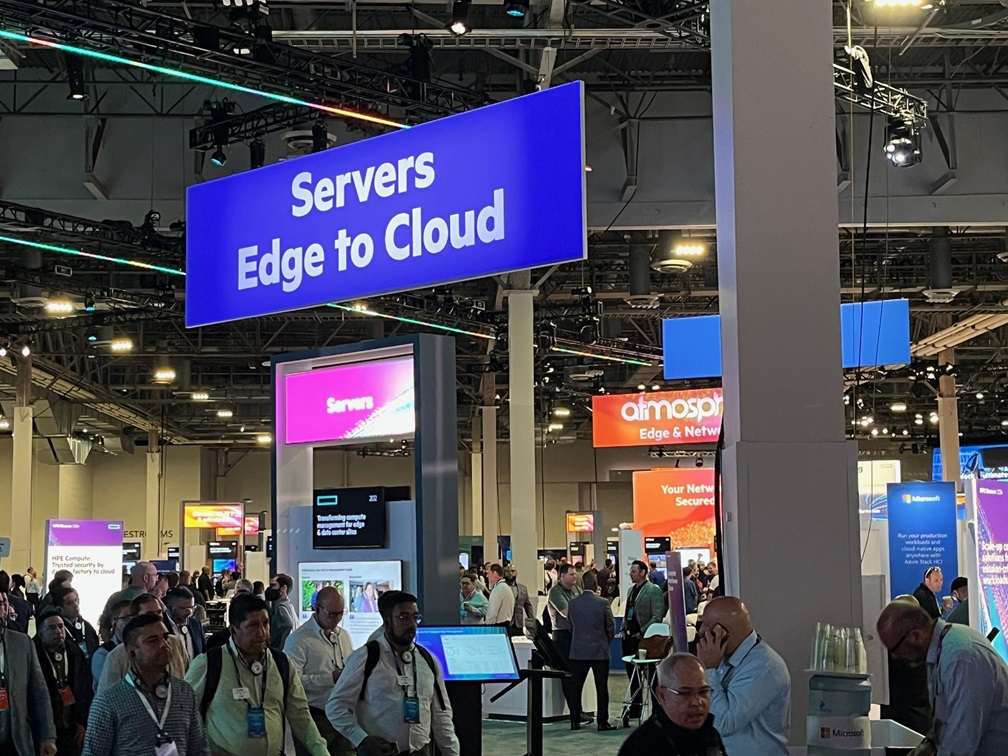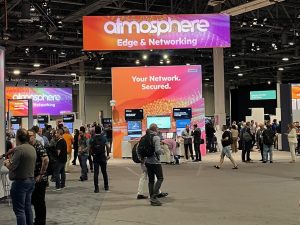 AI
AI
 AI
AI
 AI
AI
The current focus on artificial intelligence tends to highlight data-powered insights and natural language understanding, but there’s an important subtext behind the AI craze: Major enterprise players such as Hewlett Packard Enterprise Co. are also working to add new network functions that will pave the way for AI processing in a multitude of enterprise compute environments.
“Let’s not forget it’s the network that gets the data into the model,” Phil Mottram, executive vice president and general manager of HPE Intelligent Edge, declared in a keynote session at HPE Discover in Las Vegas on Tuesday. “The era of AI represents new opportunities, and the role of the network is huge.”
HPE Chief Executive Antonio Neri has made no secret of the importance his firm’s planned acquisition of Juniper Networks Inc. will mean to accelerating the deployment of AI throughout the network. The purchase of Juniper, announced in January, must still pass regulatory scrutiny, and Neri sounded optimistic in his keynote remarks at HPE Discover this week that the acquisition will still go through.
“The deal is expected to close at the end of this calendar year or early next year,” Neri said. “This will complement our overall business strategy.”
Yet Neri’s timetable hit a speed bump today when regulators in the United Kingdom announced that it would investigate whether the $14 billion acquisition could lead to competition concerns within the country. Results of the probe are expected to be published in August.
HPE’s pursuit of Juniper is reminiscent of its purchase nine years ago of Aruba Networks for $3 billion. Aruba provides data center switches and access points for wireless connectivity — key elements as AI applications and networking services become inexorably linked.
This reality was underscored at HPE Discover today as company executives outlined Aruba’s plans to integrate artificial intelligence into networking scenarios. At the heart is Aruba Networking Central, HPE’s cloud-based network management platform. Aruba has more than 4 million devices under management and more than a billion connected endpoints, according to David Hughes, chief product and technology officer at HPE’s Aruba.
“All of this comes together with Aruba Central,” Hughes said during his edge keynote presentation today.
Aruba’s approach is to provide solutions to facilitate AI for networking, employing advances in AI to make the network administrator’s job easier. It’s also pursuing networking for AI, including enhancements for handling generative AI workloads.
 HPE has taken steps to enable the former with the integration of custom AI models into Aruba Central. They allow administrators to monitor network infrastructure through a centralized interface, automatically collect data from WiFi access points, and configure networking equipment.
HPE has taken steps to enable the former with the integration of custom AI models into Aruba Central. They allow administrators to monitor network infrastructure through a centralized interface, automatically collect data from WiFi access points, and configure networking equipment.
In a keynote presentation today, HPE executives described how the company is pursuing a strategy to embed security into the network, a vision described as “security-first, AI-powered networking.”
In this scenario, access points can be used for policy enforcement using AI-automated operations. “Security and networking objectives have reached parity,” said Jon Green, chief technology and security officer at HPE.
HPE made several announcements this week around the hybrid cloud, highlighted by the unveiling of its HPE Private Cloud AI in collaboration with Nvidia Corp. HPE’s focus on hybrid is directly linked to its AI strategy. As Chief Technology Officer Fidelma Russo noted in her keynote presentation, “AI, because it is a data-hungry workload, is really a hybrid workload by nature.”
Networking will be a critical element in this hybrid strategy because HPE strongly believes that enterprises will need a hybrid solution that can fully address the entire AI lifecycle. This will include the edge, which Neri reiterated in a briefing with the media following his keynote address on Tuesday.
“A lot of inferencing will have endpoints at the edge,” Neri said. “AI requires hybrid cloud by design.”
An example of how HPE’s evolving networking story is playing out can be found in the world of professional sports, specifically with the Golden State Warriors basketball team of the NBA. The team plays in Chase Center, a sports and concert venue that opened in San Francisco in 2019.
Data is delivered and collected in the venue through thousands of edge devices that include Aruba Wi-Fi 6E access points, point-of-sale registers, security cameras and various building management hardware. And that’s before more than 18,000 fans arrive on any given day for an event.
“Without a single fan stepping inside of Chase Center, there are already 5,000 to 7,000 devices already connected to our network,” Daniel Brusilovsky, vice president of technology for the Golden State Warriors and Chase Center, explained during a briefing for the media. “You really need the network to work at really high performance.”
This is just one example of how reliant enterprises have become on networking technology in an age when a need to connect thousands of devices at any given time has become the norm. AI is poised to add a new layer of use and complexity to this model, and the message from HPE Discover in Las Vegas this week is that expectations for performance and a satisfactory result will be high among consumers and enterprises alike.
“The worst thing I could hear from a fan was ‘I couldn’t connect inside the venue,’” Brusilovsky told the assembled media. “Everything now in our building runs on the network.”
THANK YOU